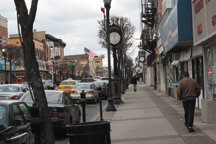Gov. Christopher Christie recently told municipalities that he intends to drain the state’s Urban Enterprise Zone accounts to help balance the $29.8 billion state budget. The UEZ is a program in which the state designates business zones of cities so that they can charge only 3.5 percent sales tax to attract customers. And the tax normally returns to the zone to help with street cleaing, police hiring, and other improvements.
Saying the situation could be worse, Bayonne Business Administrator Terrence Malloy said last week that the city will need to keep a close eye on the state’s move. “We have to see if this is a one-time thing or not,” Malloy said.
He added that the city can replenish its UEZ reserve over time if this is the only time the governor dips into the fund.
“We’re going to have to settle for what they give us and re-prioritize the expenditure of the rest.” – Terrence Malloy
________
The UEZ also funds some of the public events that bring people into the shopping district, and helps bankroll the small business loan program.
Priorities will change
Malloy said Bayonne is currently waiting to see how much money the state will return to the city – if any – after which the local board will have to determine what projects can be funded this year.
“We’re going to have to settle for what they give us and re-prioritize the expenditure of the rest,” Malloy said.
Fortunately, the city will not be forced to repay the $2.5 million loan it made to the Bayonne Crossing mall, which is to be repaid out of future UEZ tax revenues.
“That was already in place so it won’t be affected,” Malloy said.
Not the first time
This is not the first time the state has raided the UEZ fund to help cover budget costs. Last year, under Gov. Jon Corzine, the state took $1.1 million out of Bayonne’s portion of the UEZ funds, or about 5 percent of the total revenue dedicated to the city. Last year, UEZs across the state generated more than $40 million, of which about $10 million was contributed by UEZs in Hudson County.
The Urban Enterprise Zone Program was enacted by the New Jersey State Legislature in 1983 to help stimulate new economic activity and reduce unemployment within the boundaries of each zone. The establishment of these zones has helped provide incentives for businesses to come to these communities and occupy existing facilities or build new ones.
Bayonne is one of the state’s newest Urban Enterprise Zones, and was first designated on Sept. 12, 2002.
Since its inception, over 213 businesses have registered in the Bayonne Urban Enterprise Zone program.
Gov. Christie declared a “fiscal state of emergency” on Feb. 11, issuing an executive order allowing him to freeze spending and slash $2.2 billion from the budget. He said that the state also faces an $11 billion deficit in the upcoming budget, which is due to be presented to the legislature in March.
Burdened heavily with municipal services costs, New Jersey taxpayers are paying the highest property taxes of any state in the nation, which Christie hopes to relieve.
